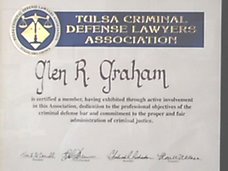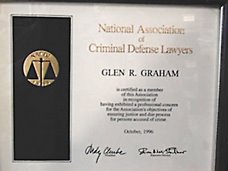Dangerous Holes in the Attorney-Client Privilege
by Glen R. Graham, Tulsa Criminal Attorney. Web: http://www.tulsacriminaldefenses.com/
Most people are aware of the attorney client privilege, sort of like the sacred confidential communications to your doctor or your minister, priest, or rabbi. Fewer people are aware of the ease with which the attorney-client privilege can be breached and the holes are so deep and dangerous that once you fall into the loop-hole you might not survive.
Ring ...... or musical tone ....... off goes the phone !!! Who can it be? Well, if it's a collect call from the jail or from a prison, the phone call is being recorded ! Yes, there is a message stating --- "this phone call may be recorded . . . . " --- but most people incorrectly assume that the call is not really being recorded. But, wait. Yes, it is being recorded and saved for up to three (3) years for use against the defendant. Even if the phone call is to relay information to the defendant's lawyer, the phone call is being recorded. The phone call to the lawyer's office is also recorded and the information discussed no longer "confidential" when law enforcement can listen to the conversation and has access to the conversation.
All letters in and out of the jail or prison are xeroxed and saved in a file folder with the defendant's name.
Breach of the Client Interview: If the defendant is out of custody and brings his wife or a friend or family member to the lawyer's office and they are present while the "confidential" communications take place then they become subject to possible subpoena.
Attorney-Client Privilege and Limitations
Posted by
Unknown
1 comments
![]()
So, if you would lie to God, why should we believe you now?
Sample Cross Examination Technique
by Glen R. Graham, Attorney at Law, Tulsa, Oklahoma
http://www.glenrgraham.com
I found an interesting brochure that gave a sample cross examination to prepare a witness for ligation (possibly a deposition or lie detector or the like) which said something like this:
(I have rewritten it and changed the characters to make it more interesting)~~~
Defense attorney/police officer/lie detector administrator: Mr. X have you in the last ten years been put in a position where you told someone a lie even a white lie, such as saying someone looks good even though they did not or that the meal they prepared was good even though it was not or said something that was not true?
Witness: Yes
Defense attorney/police officer/lie detector adminstrator: Mr. X in the last ten years, have you even once taken anything even a paper-clip or maybe borrowed a pen without returning it or maybe some other thing that you "borrowed" and you kept without returning it?
Witness: Yes
Defense attorney/police officer/lie detector administrator: So, Mr. X, by your own admission when you do these things what does it make you?
If they were being helpful --- they might say: Mr. X, would you agree that just because you made an isolated mistake it doesn't make you a liar and a thief but instead it makes you HUMAN !!!
Witness: Yes.
Of course, I am adding and changing the dialog and re-writing it. But, this idea kind of is like what some lie detector administrators do when they want to trip the guy up...... so you have stolen before and so you have lied before..... and you cheated on your wife --- you took an oath to God not to do that ..... so if you would lie to God ...... why should I believe you now ..... etc.
3rd degree .... to the 10th power.
One of many reasons not to take a lie detector test or to agree to be cross-examined by police officers.
Without knowing what kind of questions are going to be asked you have no control over the out-come of either a lie detector test or cross examination.
Police officers may even attempt to withhold the suspect's sleep or water -food or cigarettes to attempt to obtain an advantage while cross-examining the suspect and attempting to obtain a "confession" even if it is a false confession.
Yours in the Defense of Fellow Human Beings,
Glen R. Graham, Attorney for the Accused, Tulsa, Oklahoma http://www.tulsacriminaldefenses.com
Posted by
Unknown
0
comments
![]()
Tulsa Bail Bonds Reductions and How to Get the Bond Lowered
Tulsa Bail Bonds Reductions and How to Get the Bond Lowered by Tulsa Criminal Attorney, Glen R. Graham (Over 21 Years Experience) Tel. 918.583.4621
The best strategy to obtain a Tulsa bail bond reduction is to hire a Tulsa Lawyer or Attorney first such as Glen R. Graham , Attorney at Law, and when you hire me to obtain a bail bond reduction, I will file a motion and the same will be set for a hearing at least by one -two working days (not including weekends). The court will schedule a hearing and we can present argument and documents and call witnesses and present our arguments to the court as to why the bond should be reduced. If the court grants a bond redution, I can refer you to several good local bondsman such as to A Bargain Bail Bonds of Tulsa at 918-583-6600 or others.
On a case by case basis, it may be possible to get the Judge to consider releasing the defendant on a pre-trial court services release either with or without an ankle monitor depending upon all of the circumstances of the case. Certain offenses such as violent felonies and certain other types of felony offenses may not qualify for consideration. But, in the right case, the court may allow the defendant's release on pre-trial release without having to pay funds to a bondsman. By filing a motion for bond reduction or release on pretrial court services release, the matter can be brought to the court's attention for consideraiton.
In considering a Tulsa bail bond reduction, the court will consider the purpose of bond which is to guarantee the appearance of the defendant at any future court dates and not to punish the defendant. Additionally, the court will consider the factors set forth in Oklahoma and Supreme Court decisions.
Unless the right to bail before trial is preserved, the presumption of innocence would lose its meaning. See Stack v. Boyle, 342 U.S. 1, 4, 72 S.Ct. 1, 3, 96 L.Ed. 3 (1951). The online Justice Denied Magazine has stories about when the presumption of innocence goes wrong and people are wrongfully convicted. Also, see the on-line blog of Justice Denied Blog. The sixth (6th) Amendment right to a speedy trial over-laps with the other rights in the Constitution and with the presumption of innocence. Prolonged pretrial incarceration before trial is tantamount to punishment before trial and violates the presumption of innocence. Check out the web site http://www.innocence.org and the numerous over-turned convictions --- some where people gave false confessions. Tulsa, Oklahoma is home to one of the largest jury verdicts for over-turned DNA --- convitions - false photo identification --- 14.5 million dollar jury verdict reduced to 12.25 million on appeal ---- Alvin McGee, Jr. v. City of Tulsa - Northern District of Oklahoma. Oklahoma was recently found to have the highest rate of incarceration for women in the nation according to the national bureau of crime statistics (2006).
The U.S. Supreme Court has noted that prolonged pretrial detention prior to an independent determination of probable cause may unjustly “imperil a suspect’s job, interrupt his source of income, and impair his family relationships.” See, Gerstein v. Pugh, 420 U.S. 103, 95 S.Ct. 854, 43 L.Ed.2d 54 (1975).
The purpose of bail is to assure the appearance of the accused at such times as the court may direct, and that bond should never be used for the purpose of punishing the accused, but the sole guide in fixing the amount thereof should be to cause the accused appearance to answer the charge against him. See, Application of Owen, 349 P.2d 786 (Okl.Cr. 1960); Ex Parte Knight, 289 P.2d 156 (Okl.Cr. 1955), Gibson v. State, 655 P.2d 1028 (1982).
In Clark v Hall, 2002 OK 29 (2002), the court held that defendant’s have a due process right to an individualized determination of bail and that “bail in Oklahoma is not and cannot serve as a criminal punishment.” The right to the protection against the denial of bail and excessive bail has historical roots. The Magna Carta and the United States Constitution Bill of Rights and the Oklahoma Constitution contain provisions protecting an individual’s right to bail.
Presently, the judges of the State of Oklahoma are required to consider the guidelines set forth in 1979 in Petition of Humphrey, 1979 OK CR 97, 601 P.2d 103, when setting the amount of bail. These guidelines include:
1. The seriousness of the crime charged against the defendant, the apparent likelihood of conviction and the extent of the punishment prescribed by the Legislature;
2. The defendant's criminal record, if any, and previous record on bail if any;
3. His reputation, and mental condition;
4. The length of his residence in the community;
5. His family ties and relationships;
6. His employment status, record of employment and his financial condition;
7. The identity of responsible members of the community who would vouch for defendant's reliability;
8. Any other factors indicating defendant's mode of life, or ties to the community or bearing on the risk of failure to appear.
The Tulsa District Court has rules dealing with the handling or setting of bonds. Currently, there are some recommended bond amounts for different types of charges but under the current case law, a court is supposed to consider the individual factors of the case which can be reviewed when the defendant’s attorney files a motion for bond reduction.
An Oklahoma attorney general opinion has suggested that bail bond guidelines may even be unconstitutional because a court is required to consider the individual factors and circumstances of the case. See Oklahoma Criminal Defense Blog regarding attorney general opinion on bail bonds schedules. Furthermore, read the Oklahoma Attorney General Drew Edmondson Attorney General Opinion Here which states:
Attorney General Opinion 2000 OK AG 61 (Number 61 - Decided 12-11-2000):
Attorney General says predetermined bond schedules determined by Judges unconstitutional:
"17 By focusing on the crime committed as opposed to the circumstances of the individual arrestee, there is no guarantee that a defendant will return for hearing. In addition, failure to review the Humphrey factors may produce a bail amount that is excessive and, thus, unconstitutional.
¶18 As noted above, a court may not adopt rules that conflict with constitutional provisions. For the reasons statedabove, the use of a jail bail schedule infringes on defendants' constitutional rights guaranteed by both the Oklahomaand United States Constitutions."
"Accordingly, judges may not promulgate administrative rules that mandate the use of a bail schedule based on the crime of which a defendant is accused. It is, therefore, the official Opinion of the Attorney General that: A presiding judge has no authority to establish, by rule or otherwise, a bail schedule which contains predetermined bail amounts based on the crimes committed. "
Yours in the Defense of Fellow Human Beings,
Glen R. Graham, Attorney at Law, Tulsa, Oklahoma
Posted by
Unknown
1 comments
![]()





